Python script packaging exe, auto-py-to-exe will help you!
Apr 13, 2023 pm 04:49 PM1. What is auto-py-to-exe
auto-py-to-exe is a graphic used to package Python programs into executable files ization tools. This article mainly introduces how to use auto-py-to-exe to complete python program packaging. auto-py-to-exe is based on pyinstaller. Compared with pyinstaller, it has an additional GUI interface and is simpler and more convenient to use.
2. Install auto-py-to-exe
First We need to ensure that our python environment is greater than or equal to 2.7 and then enter in cmd: pip install auto-py-to-exe. After the input is completed, pip will install the auto-py-to-exe package. After the installation is complete, we can enter: auto-py-to-exe in cmd to start the auto-py-to-exe program.
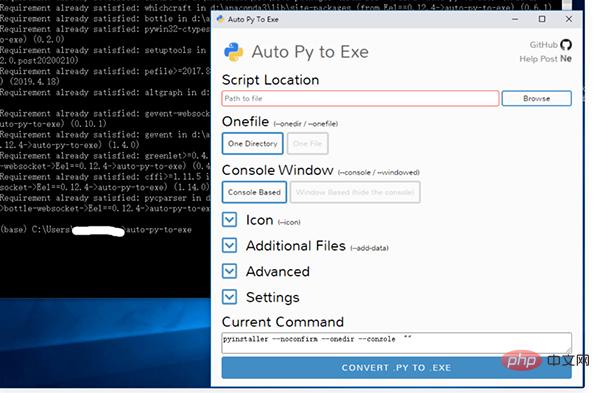
When the above picture appears, auto-py-to-exe is successfully installed.
3. Introduction to some options of auto-py-to-exe
When using auto-py-to-exe to package python programs, there are many configuration options that we need to specify. How to correctly It's important to know what these options do. Below I'll cover some of the important options.
(1) Script Location
Script Location mainly specifies the python file we want to package

(2) Onefile
There are two options under Onefile, namely: One Directory and One File
- If you select One Directory, the program will be displayed in the form of a folder after packaging is completed
- If you select One File, then after the program packaging is completed, there will be an .exe file
(3) Console Window
Console Window mainly sets whether the console appears when the packaging program is running
- Console Based: When the packaged program is run, a console interface will be displayed
- Window Based (hide the console): The console interface will be hidden, mainly used for programs with GUI python program packaging
(4) Icon
Icon used to specify the packaged program
4. auto-py-to-exe actual combat
This section mainly uses a calculator program to introduce how to use auto-py-to-exe to package the program.
auto-py-to-exe packaging program is mainly divided into 3 parts, namely:
- Open auto-py-to-exe
- Configure packaging options
- Check the packaging effect
1. Open auto-py-to-exe
Open cmd, enter: auto-py-to-exe Open auto-py- to-exe, we have to make configuration selections.
2. Configure packaging options
Calculator program, you can download it from GitHub, the address is: https://github.com/pythonprogrammingbook/simple_calculator
In packaging At this time, the configuration we need to perform mainly includes:
- Script Location
- Onefile
- Console Window
Script Location Select the program For the main program, in the calculator project, we choose main.py
Onefile Select One File because one file looks simpler
Since the calculator project has a GUI, Console Window Select Window Based (hide the console),
Icon Select an ico file, this operation is not required, you don’t need to set it
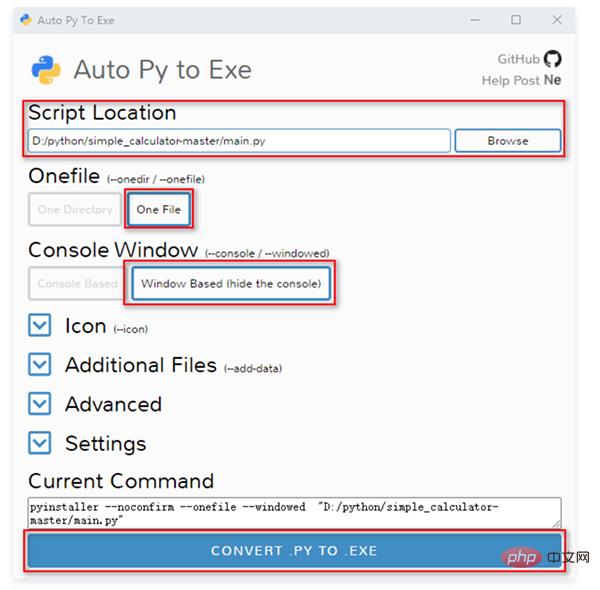
If there is one in the program For our own module, we must add the module's directory to Additional Files. Otherwise, the Failed to execute script XXX error will appear

#In the calculator program, all our modules are in the calculation directory, so we need to add the calculation path to Additional Files.
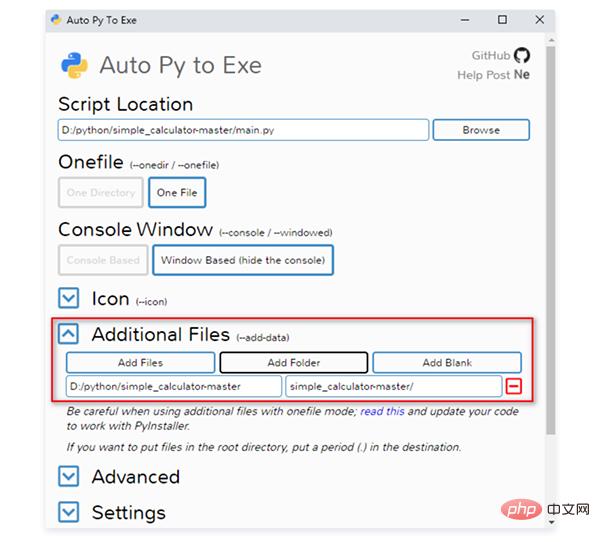
After the configuration is completed, click the CONVERT .PY TO .EXE button
In this way, we have completed the packaging of a calculator project.
3. View the packaging effect
After the program completes packaging, we can click the OPEN OUTPUT FOLDER button, and then the path to the packaged file will be opened.
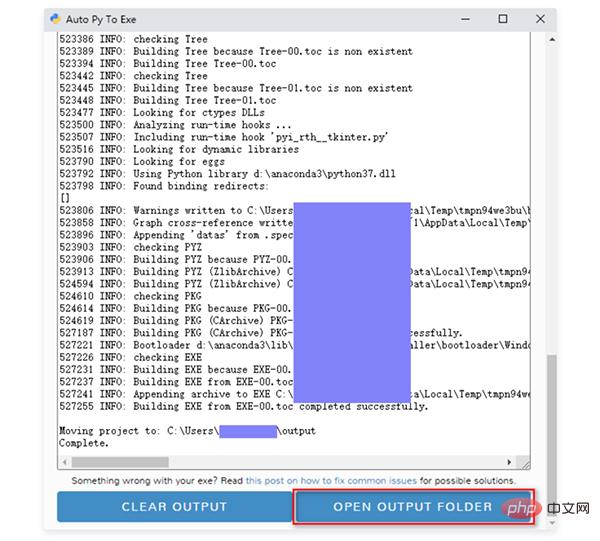
In the packaging file directory, we can see a main.exe file, which is our packaging file.
Click main.exe and you will see a calculator program.
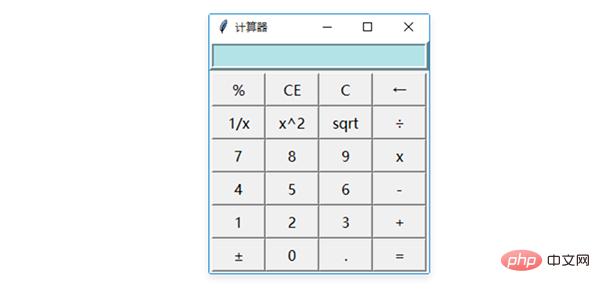
At this point, the packaging work has been successfully completed.
5. Summary
This article mainly introduces how to use auto-py-to-exe to package python programs. But this only introduces the simplest Python program packaging. If you want to package complex programs, the above configuration will definitely not work.
If you want to know more about auto-py-to-exe, I suggest you study pyinstaller. auto-py-to-exe is based on pyinstaller. Studying pyinstaller will have a very obvious effect on our in-depth use of auto-py-to-exe.
If you want to know more about pyinstaller, you can read the official documentation.
The above is the detailed content of Python script packaging exe, auto-py-to-exe will help you!. For more information, please follow other related articles on the PHP Chinese website!

Hot AI Tools

Undress AI Tool
Undress images for free

Undresser.AI Undress
AI-powered app for creating realistic nude photos

AI Clothes Remover
Online AI tool for removing clothes from photos.

Clothoff.io
AI clothes remover

Video Face Swap
Swap faces in any video effortlessly with our completely free AI face swap tool!

Hot Article

Hot Tools

Notepad++7.3.1
Easy-to-use and free code editor

SublimeText3 Chinese version
Chinese version, very easy to use

Zend Studio 13.0.1
Powerful PHP integrated development environment

Dreamweaver CS6
Visual web development tools

SublimeText3 Mac version
God-level code editing software (SublimeText3)
 PHP calls AI intelligent voice assistant PHP voice interaction system construction
Jul 25, 2025 pm 08:45 PM
PHP calls AI intelligent voice assistant PHP voice interaction system construction
Jul 25, 2025 pm 08:45 PM
User voice input is captured and sent to the PHP backend through the MediaRecorder API of the front-end JavaScript; 2. PHP saves the audio as a temporary file and calls STTAPI (such as Google or Baidu voice recognition) to convert it into text; 3. PHP sends the text to an AI service (such as OpenAIGPT) to obtain intelligent reply; 4. PHP then calls TTSAPI (such as Baidu or Google voice synthesis) to convert the reply to a voice file; 5. PHP streams the voice file back to the front-end to play, completing interaction. The entire process is dominated by PHP to ensure seamless connection between all links.
 How to use PHP combined with AI to achieve text error correction PHP syntax detection and optimization
Jul 25, 2025 pm 08:57 PM
How to use PHP combined with AI to achieve text error correction PHP syntax detection and optimization
Jul 25, 2025 pm 08:57 PM
To realize text error correction and syntax optimization with AI, you need to follow the following steps: 1. Select a suitable AI model or API, such as Baidu, Tencent API or open source NLP library; 2. Call the API through PHP's curl or Guzzle and process the return results; 3. Display error correction information in the application and allow users to choose whether to adopt it; 4. Use php-l and PHP_CodeSniffer for syntax detection and code optimization; 5. Continuously collect feedback and update the model or rules to improve the effect. When choosing AIAPI, focus on evaluating accuracy, response speed, price and support for PHP. Code optimization should follow PSR specifications, use cache reasonably, avoid circular queries, review code regularly, and use X
 python seaborn jointplot example
Jul 26, 2025 am 08:11 AM
python seaborn jointplot example
Jul 26, 2025 am 08:11 AM
Use Seaborn's jointplot to quickly visualize the relationship and distribution between two variables; 2. The basic scatter plot is implemented by sns.jointplot(data=tips,x="total_bill",y="tip",kind="scatter"), the center is a scatter plot, and the histogram is displayed on the upper and lower and right sides; 3. Add regression lines and density information to a kind="reg", and combine marginal_kws to set the edge plot style; 4. When the data volume is large, it is recommended to use "hex"
 PHP integrated AI emotional computing technology PHP user feedback intelligent analysis
Jul 25, 2025 pm 06:54 PM
PHP integrated AI emotional computing technology PHP user feedback intelligent analysis
Jul 25, 2025 pm 06:54 PM
To integrate AI sentiment computing technology into PHP applications, the core is to use cloud services AIAPI (such as Google, AWS, and Azure) for sentiment analysis, send text through HTTP requests and parse returned JSON results, and store emotional data into the database, thereby realizing automated processing and data insights of user feedback. The specific steps include: 1. Select a suitable AI sentiment analysis API, considering accuracy, cost, language support and integration complexity; 2. Use Guzzle or curl to send requests, store sentiment scores, labels, and intensity information; 3. Build a visual dashboard to support priority sorting, trend analysis, product iteration direction and user segmentation; 4. Respond to technical challenges, such as API call restrictions and numbers
 python list to string conversion example
Jul 26, 2025 am 08:00 AM
python list to string conversion example
Jul 26, 2025 am 08:00 AM
String lists can be merged with join() method, such as ''.join(words) to get "HelloworldfromPython"; 2. Number lists must be converted to strings with map(str, numbers) or [str(x)forxinnumbers] before joining; 3. Any type list can be directly converted to strings with brackets and quotes, suitable for debugging; 4. Custom formats can be implemented by generator expressions combined with join(), such as '|'.join(f"[{item}]"foriteminitems) output"[a]|[
 python connect to sql server pyodbc example
Jul 30, 2025 am 02:53 AM
python connect to sql server pyodbc example
Jul 30, 2025 am 02:53 AM
Install pyodbc: Use the pipinstallpyodbc command to install the library; 2. Connect SQLServer: Use the connection string containing DRIVER, SERVER, DATABASE, UID/PWD or Trusted_Connection through the pyodbc.connect() method, and support SQL authentication or Windows authentication respectively; 3. Check the installed driver: Run pyodbc.drivers() and filter the driver name containing 'SQLServer' to ensure that the correct driver name is used such as 'ODBCDriver17 for SQLServer'; 4. Key parameters of the connection string
 python pandas melt example
Jul 27, 2025 am 02:48 AM
python pandas melt example
Jul 27, 2025 am 02:48 AM
pandas.melt() is used to convert wide format data into long format. The answer is to define new column names by specifying id_vars retain the identification column, value_vars select the column to be melted, var_name and value_name, 1.id_vars='Name' means that the Name column remains unchanged, 2.value_vars=['Math','English','Science'] specifies the column to be melted, 3.var_name='Subject' sets the new column name of the original column name, 4.value_name='Score' sets the new column name of the original value, and finally generates three columns including Name, Subject and Score.
 Optimizing Python for Memory-Bound Operations
Jul 28, 2025 am 03:22 AM
Optimizing Python for Memory-Bound Operations
Jul 28, 2025 am 03:22 AM
Pythoncanbeoptimizedformemory-boundoperationsbyreducingoverheadthroughgenerators,efficientdatastructures,andmanagingobjectlifetimes.First,usegeneratorsinsteadofliststoprocesslargedatasetsoneitematatime,avoidingloadingeverythingintomemory.Second,choos







